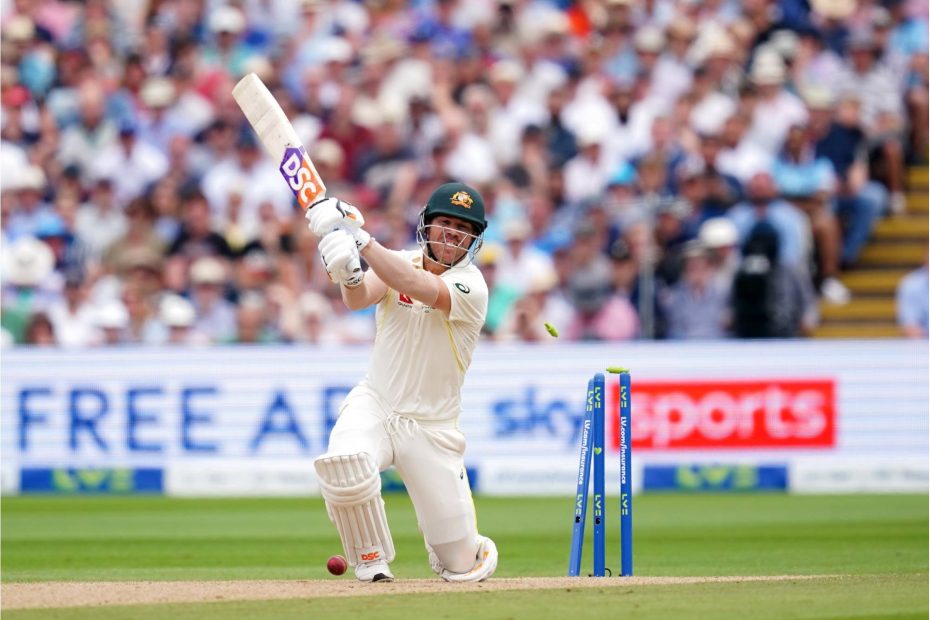Mitchell Johnson was well within his rights to launch a double-barrelled attack on two former teammates David Warner and George Bailey but it’s not going to change anything.
Warner is going to get his desired send-off from Test cricket at an SCG New Year’s Test and Bailey will keep his teflon reputation as a chief selector who deflects all criticism with a smile.
Previous selection chiefs like Trevor Hohns and Andrew Hilditch struggled to enunciate their strategies with PR panache but were not afraid to make the tough calls.
Bailey is much smoother in front of the media’s glare but his willingness to fulfil the main responsibility of making the right decision instead of the popular one is questionable.
As a former national white-ball skipper, he is experienced at fielding, dodging and defusing the media’s leading questions and he was at it again on Sunday, charming his way through a video media conference with Australia’s cricketing scribes about the first Test squad.
(Photo by David Davies/PA Images via Getty Images)
Quickly he was asked about the justification for Warner’s inclusion for the three-match assignment in the wake of middling red-ball form over the past three years and Johnson’s volatile column for The West Australian newspaper which questioned how a player with such a spotty recent record on the field and a dubious one off it should be given “a hero’s send-off”.
Bailey momentarily lost the glint in his eye and the smile from his lips as he icily replied that”I hope he’s OK” when asked about Johnson.
After being asked to clarify whether that meant he thought Johnson was not OK for whatever reason, he added: “I’ve got no idea.”
Despite a few more shots across his bow from reporters trying to get more out of Bailey on Johnson’s blunt force criticisms, he batted them away with customary ease.
If he was any more of a polished media performer, he’d shine.
The most he delved into Johnson’s verbal bumper barrage was when asked about the former quick’s assertion that Bailey was too close to the players because he’d been seen helping out at net sessions.
“My only observation would be if someone can show me how being distant and unaware of what players are going through and what the plans are with the team and with the coaching staff – how that’s more beneficial – I’d be all ears.”
It was another example of Bailey turning an issue on its head while not directly answering the question.
Johnson was not saying that a selector should be distant or unaware of what players are going through but saying that Bailey appeared too chummy with them when he wrote: “I also wonder what the role of the head selector is these days. It seems to have moved to be a part of the inner sanctum, rather than standing aside from it. There are now throwdowns for the players, golfing together and celebrating wins to all hours.”
Mitchell Johnson and George Bailey celebrate after completing the 5-0 Ashes rout in 2014. (Photo by Matt King/Getty Images)
He is spot on there. Even if Bailey doesn’t think being part of the team set-up at training or at matches makes any difference to how he selects teams, it creates the perception that he’s one of the boys.
Previous captains have asked not to be part of the selection of teams because they found it hard to drop teammates who were also their mates.
Johnson made reference to Bailey abstaining from the decision to force Tim Paine out two years ago and he clearly thinks history repeating with the selectors unwilling to see Warner has not been cutting the mustard for a long time.
Bailey mentioned that Warner was only picked for the first Test against Pakistan and there were no guarantees that the 37-year-old opener or any other player for that matter would be automatic selections for all three matches.
It would take four consecutive single-figure scores against a heavy depleted touring attack for the selectors to even consider denying Warner his planned farewell in front of family and friends at the SCG.
Bailey even went so far as to liken Warner’s looming exit to 16 years ago when Shane Warne called it quits and the Australians cycled through several spinners trying to find a long-term replacement
“I’d put David in that category, the way he’s opened the batting for Australia for such a long period,” Bailey said.
The only real similarities between Warner and Warne is their surname.
George Bailey. (Photo by Quinn Rooney/Getty Images)
One has been a very good player for a lengthy time whose average has slid south of 45 as his powers have diminished.
The other was the greatest player to spin a ball, named one of five cricketers of the 20th century who left an indelible mark and even bigger footsteps for his successors to follow in.
Bailey and fellow selectors Tony Dodemaide and coach Andrew McDonald have had more than their fair share of critics for their conservative and occasionally puzzling choices but winning has currency so on the back of retaining the Ashes, lifting the World Test Championship and ODI World Cup on foreign soil, they’ve been vindicated for their often unpopular decisions.
The old “you don’t change a winning combination” approach. Well, that’s not always the case.
One irony of the current situation with Warner is that Bailey is being patient with a player putting up modest stats when his own Test career was kyboshed rapidly even though the team didn’t lose once in his five matches of the 2013-14 Ashes campaign.
Bailey was starting to show glimpses that he could handle the step up to Tests but was never selected again after that 5-0 whitewash spearheaded by a career-best purple patch from none other than one Mitchell Guy Johnson.
